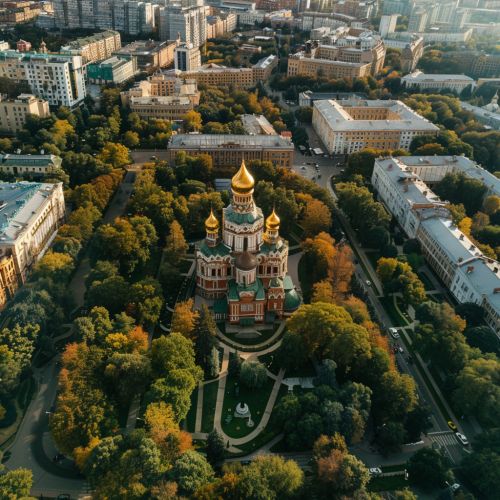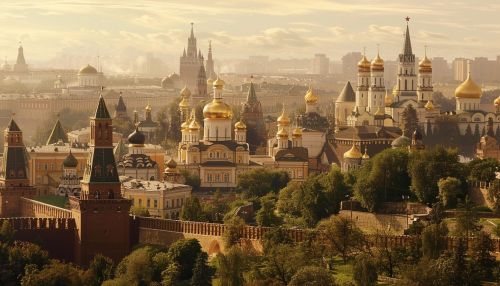Moscow: Difference between revisions
(Created page with "== History == Moscow is a city with a rich and complex history. The first known reference to Moscow dates back to 1147 when it was an obscure town in a small province. Over the centuries, it has grown into a global city and the political, economic, and cultural center of Russia. The city's early history is marked by the Mongol invasion in the 13th century, which left it under Mongol rule for more than two centuries. During this period, Moscow began to assert it...") |
No edit summary |
||
| Line 1: | Line 1: | ||
== History == | == History == | ||
[[Moscow]] is a | The history of [[Moscow|Moscow]], the capital of [[Russia|Russia]], is a chronicle of over eight centuries, beginning in the 12th century. It was first mentioned in the chronicles in 1147, when Prince [[Yuri Dolgorukiy|Yuri Dolgorukiy]] invited his relative, Prince Svyatoslav Olgovich, to a feast. This marked the birth of Moscow, a city that would eventually grow to be one of the most influential metropolises in the world. | ||
[[Image:Detail-71003.jpg|thumb|center|A historical view of Moscow with its ancient buildings and structures.|class=only_on_mobile]] | |||
[[Image:Detail-71004.jpg|thumb|center|A historical view of Moscow with its ancient buildings and structures.|class=only_on_desktop]] | |||
== Geography == | |||
Moscow is situated in the western part of Russia, in the vast East European Plain. The city spans over a total area of 2,511 square kilometers and is divided by the [[Moskva River|Moskva River]]. The city's geography is characterized by flat terrain, with the highest point being Teplostanskaya highland at 255 meters above sea level. | |||
== Climate == | |||
Moscow experiences a [[Humid continental climate|humid continental climate]], with long, cold winters and warm, humid summers. The city's climate is influenced by its inland position, resulting in a significant temperature difference between seasons. | |||
== | == Demographics == | ||
Moscow is | As of the latest census, Moscow is home to over 12 million residents, making it the most populous city in Russia and the seventh most populous city in the world. The city is a melting pot of cultures, with people from various ethnic backgrounds residing here. | ||
== Government and Politics == | |||
Moscow serves as the political center of Russia, housing the country's top government offices, including the [[Kremlin|Kremlin]], the official residence of the President of Russia. The city's local government is headed by a Mayor, who is elected by the citizens of Moscow. | |||
== | == Economy == | ||
Moscow's economy is one of the largest among world cities and represents about 22% of Russia's GDP. The city is a major economic center for Russia and Eastern Europe, hosting a large number of businesses and serving as the headquarters for many multinational corporations. | |||
== Culture == | |||
== | |||
Moscow is | Moscow is a cultural hub, boasting a rich history and a vibrant arts scene. The city is home to renowned cultural institutions such as the [[Bolshoi Theatre|Bolshoi Theatre]], the [[Tretyakov Gallery|Tretyakov Gallery]], and the [[Pushkin Museum|Pushkin Museum]]. | ||
== Education == | |||
[[ | Moscow is a major educational center in Russia and Eastern Europe. The city is home to several prestigious universities, including [[Moscow State University|Moscow State University]], one of the oldest and most respected institutions of higher learning in Russia. | ||
== | == Transportation == | ||
Moscow | Moscow boasts an extensive transportation network, which includes the [[Moscow Metro|Moscow Metro]], one of the deepest subway systems in the world. The city is also served by several international airports, including [[Sheremetyevo International Airport|Sheremetyevo International Airport]] and [[Domodedovo International Airport|Domodedovo International Airport]]. | ||
The city is also | |||
== See Also == | == See Also == | ||
* [[History of | * [[History of Moscow]] | ||
* [[Geography of | * [[Geography of Moscow]] | ||
* [[Economy of | * [[Economy of Moscow]] | ||
[[Category:Cities in Russia]] | |||
[[Category:Capital cities]] | [[Category:Capital cities]] | ||
[[Category:Historical cities]] | [[Category:Historical cities]] | ||
Latest revision as of 21:15, 22 April 2024
History
The history of Moscow, the capital of Russia, is a chronicle of over eight centuries, beginning in the 12th century. It was first mentioned in the chronicles in 1147, when Prince Yuri Dolgorukiy invited his relative, Prince Svyatoslav Olgovich, to a feast. This marked the birth of Moscow, a city that would eventually grow to be one of the most influential metropolises in the world.


Geography
Moscow is situated in the western part of Russia, in the vast East European Plain. The city spans over a total area of 2,511 square kilometers and is divided by the Moskva River. The city's geography is characterized by flat terrain, with the highest point being Teplostanskaya highland at 255 meters above sea level.
Climate
Moscow experiences a humid continental climate, with long, cold winters and warm, humid summers. The city's climate is influenced by its inland position, resulting in a significant temperature difference between seasons.
Demographics
As of the latest census, Moscow is home to over 12 million residents, making it the most populous city in Russia and the seventh most populous city in the world. The city is a melting pot of cultures, with people from various ethnic backgrounds residing here.
Government and Politics
Moscow serves as the political center of Russia, housing the country's top government offices, including the Kremlin, the official residence of the President of Russia. The city's local government is headed by a Mayor, who is elected by the citizens of Moscow.
Economy
Moscow's economy is one of the largest among world cities and represents about 22% of Russia's GDP. The city is a major economic center for Russia and Eastern Europe, hosting a large number of businesses and serving as the headquarters for many multinational corporations.
Culture
Moscow is a cultural hub, boasting a rich history and a vibrant arts scene. The city is home to renowned cultural institutions such as the Bolshoi Theatre, the Tretyakov Gallery, and the Pushkin Museum.
Education
Moscow is a major educational center in Russia and Eastern Europe. The city is home to several prestigious universities, including Moscow State University, one of the oldest and most respected institutions of higher learning in Russia.
Transportation
Moscow boasts an extensive transportation network, which includes the Moscow Metro, one of the deepest subway systems in the world. The city is also served by several international airports, including Sheremetyevo International Airport and Domodedovo International Airport.
